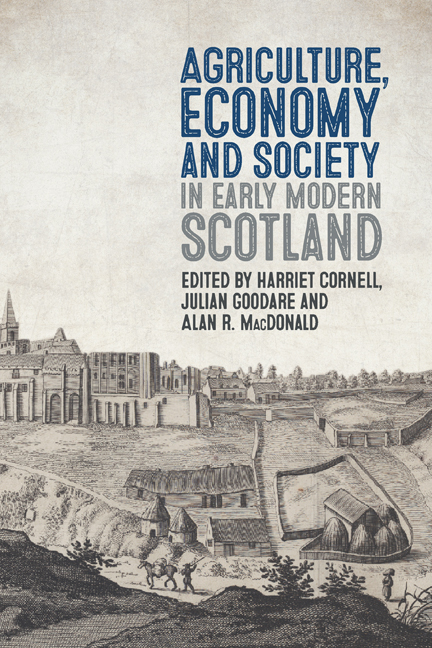Book contents
- Frontmatter
- Dedication
- Contents
- Illustrations
- Contributors
- Acknowledgements
- Note on Currency and Measures
- Abbreviations
- Map of Scotland
- Introduction: Exploring Scotland’s Agricultural History
- 1 Imagining Scottish Agriculture before the Improvers
- 2 The Use of Dykes in Scottish Farming 1500–1700
- 3 The Famine of 1622–23 in Scotland
- 4 Weather and Farming through the Eyes of a Sixteenth-Century Highland Peasant
- 5 Stock, Fermes, Mails and Duties in a Midlothian Barony 1587–89
- 6 The Roots of Improvement: Early Seventeenth-Century Agriculture on the Mains of Dundas, Linlithgowshire
- 7 ‘God Knowis my Sleipis ar Short and Unsound’: Andro Smyth’s Collection of Rent, Tax, Teind and Tolls in Shetland c.1640
- 8 Farming in the Stirling Area 1560–1750
- 9 What Were the Fiars Prices Used For?
- 10 Agriculture and Banking in Eighteenth-Century Scotland 1695–1750
- 11 Capitalism’s Cradle? Ideas, Policies and the Rise of the Scottish Economy in the Mercantilist Age 1600–1800
- Conclusion: A Historiographical and Bibliographical Overview
- Index
- Boydell Studies in Rural History
1 - Imagining Scottish Agriculture before the Improvers
Published online by Cambridge University Press: 14 May 2024
- Frontmatter
- Dedication
- Contents
- Illustrations
- Contributors
- Acknowledgements
- Note on Currency and Measures
- Abbreviations
- Map of Scotland
- Introduction: Exploring Scotland’s Agricultural History
- 1 Imagining Scottish Agriculture before the Improvers
- 2 The Use of Dykes in Scottish Farming 1500–1700
- 3 The Famine of 1622–23 in Scotland
- 4 Weather and Farming through the Eyes of a Sixteenth-Century Highland Peasant
- 5 Stock, Fermes, Mails and Duties in a Midlothian Barony 1587–89
- 6 The Roots of Improvement: Early Seventeenth-Century Agriculture on the Mains of Dundas, Linlithgowshire
- 7 ‘God Knowis my Sleipis ar Short and Unsound’: Andro Smyth’s Collection of Rent, Tax, Teind and Tolls in Shetland c.1640
- 8 Farming in the Stirling Area 1560–1750
- 9 What Were the Fiars Prices Used For?
- 10 Agriculture and Banking in Eighteenth-Century Scotland 1695–1750
- 11 Capitalism’s Cradle? Ideas, Policies and the Rise of the Scottish Economy in the Mercantilist Age 1600–1800
- Conclusion: A Historiographical and Bibliographical Overview
- Index
- Boydell Studies in Rural History
Summary
Most of what we know about agriculture in early modern Scotland comes from written sources concerned directly to record its business aspects. Estate papers record landlords’ dealings with their tenants. Testaments record farmers’ possessions. Baron court minutes record the adjudication of disputes and the making of agricultural rules. All these records had to be written in order to keep track of people's property and to enforce property rights. Although they were written for the benefit of those with substantial landed property, they also give us glimpses of the farm work of the propertyless. Such sources have enabled historians – including those contributing to this book – to answer many questions about early modern agriculture.
But are there other questions that we can ask – questions that these businesslike records cannot answer? Here I have in mind questions about the cultural meanings of agriculture for educated and literate Scots. What did agriculture mean to these people, who were almost never farmers themselves? Even the literate elite lived in daily proximity to tilled fields in which they saw crops growing, pastures in which they saw cattle and sheep grazing, and farming settlements in which they saw poultry scratching. The peasants who worked those fields, herded those animals and inhabited those settlements were often their own tenants, some of whom they may have known personally. Everyday diets, even of members of the elite, contained many meat, dairy and grain products derived from those same fields, processed locally in recognisable ways by those same peasants. The elite also craved exotic luxuries, but these were paid for, as they well knew, by their tenants’ rents. The seasonal round, even for the elite, was tangibly shaped by agriculture, with spring ploughing and autumn harvesting as intense periods in which landlords’ attention would be drawn to their estates. Culturally speaking, how did members of the elite experience all this? What did agriculture mean to them?
This chapter will range beyond the familiar sources for agricultural history. It will examine, not what people had to write about agriculture, but what they chose to write about it when they didn't have to. One point should be stressed at the outset: the harvest of such voluntary writing is far from bountiful. The sources discussed in this chapter are all informative in some way, but also informative is the enormous silence maintained about agriculture by most literate Scots in this period.
- Type
- Chapter
- Information
- Publisher: Boydell & BrewerPrint publication year: 2024



